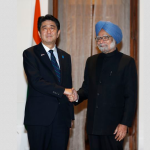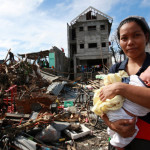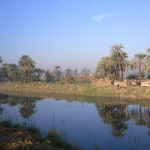- DETERRENCE: Coercive Nuclear Campaigns in the 21st Century: Understanding Adversary Incentives and Options for Nuclear Escalation
- DPRK: A Nuclear North Korea VS a Strategically Patient U.S.: Who wins?
- GOVERNANCE AND CIVIL SOCIETY: China-led Project to Start Regional Bank Snubs Japan, India
- CLIMATE CHANGE ADAPTATION: Towards a Resilient Future – Children and Disasters, Special Issue No. 104, All India Disaster Mitigation Institute
- ENERGY SECURITY: Climate Change: An Upcoming Threat with Little Political Traction During Lok Sabha Elections
- CLIMATE CHANGE AND SECURITY: Beyond Scarcity: Rethinking Water, Climate Change and Conflict in the Sudans
 DETERRENCE: Coercive Nuclear Campaigns in the 21st Century: Understanding Adversary Incentives and Options for Nuclear Escalation, K. Lieber, D. Press, PASCC, Naval Postgraduate School, 2013
DETERRENCE: Coercive Nuclear Campaigns in the 21st Century: Understanding Adversary Incentives and Options for Nuclear Escalation, K. Lieber, D. Press, PASCC, Naval Postgraduate School, 2013
Nuclear escalation to achieve ceasefire before conventional defeat by US & allies most likely in North Korea. CFC operations to degrade KPA C3I, destroy its leadership, and strike strategic forces, including nuclear weapons, may induce nuclear strikes from the DPRK. [PDF, 1.3MB]
- The Case for Conventional Deterrence, Tom Nichols, The National Interest, April 20, 2014.
- U.S. Confronts Consequences of Underestimating North Korean Leader, David Sanger, New York Times, April 24, 2014
 DPRK: A Nuclear North Korea VS a Strategically Patient U.S.: Who wins?, Leon V. Sigal, The National Interest. (24 April 2014)
DPRK: A Nuclear North Korea VS a Strategically Patient U.S.: Who wins?, Leon V. Sigal, The National Interest. (24 April 2014)
There seems to be a sense of criticality about North Korea’s programs and status. U.S. policy of strategic patience assumes South Korea will set the pace and timing of the relationship, however North Korea develops military capabilities without developing an economy to underpin those capabilities or public diplomacy to allay fears raised by those programs. Even Russia decided to write off $10 billion in North Korean debt. China may even be so concerned about the state of North Korea that it shared information with Japan. According to those plans, as opposed to previously alleged plans, China will not attempt to save North Korea.
- China’s secret plan for North Korea’s collapse, revealed, Max Fisher, Vox.com. (6 May2014)
- CTBTO head on North Korean nuclear test reports, Lassina Zerbo on North Korea Tech video channel. (28 April 2014) [Video, 1:42]
- Russian President Vladimir Putin’s approves cancelling $10 billion in debt owed by North Korea, People’s Daily Online. (6 May 2014) [Chinese language]
 GOVERNANCE AND CIVIL SOCIETY: China-led Project to Start Regional Bank Snubs Japan, India, Etsushi Tsuru, Asahi Shimbun (4 May 2014)
GOVERNANCE AND CIVIL SOCIETY: China-led Project to Start Regional Bank Snubs Japan, India, Etsushi Tsuru, Asahi Shimbun (4 May 2014)
Japan, India and the US have been thus far excluded from any talks on China’s recent initiative to establish a new regional multilateral development bank, although 15 Asian nations, including the ROK, have been approached by China. The bank is expected to bolster China’s regional influence and is viewed by some to be a competitor to the Asian Development Bank, where Japan and the US are often viewed to have the greatest sway.
- Friend or foe? ADB and a future China-led development bank, Lean Alfred Santos, Devex (6 May 2014)
- New Chinese-led development bank seen as threat to ADB, Elliot Wilson, Anthony Rowley and Steven Gilmore, Emerging Markets (5 March 2014)
 CLIMATE CHANGE ADAPTATION: Towards a Resilient Future – Children and Disasters, Special Issue No. 104, All India Disaster Mitigation Institute, India, 2014 [1.01 MB, PDF]
CLIMATE CHANGE ADAPTATION: Towards a Resilient Future – Children and Disasters, Special Issue No. 104, All India Disaster Mitigation Institute, India, 2014 [1.01 MB, PDF]
Disasters impact children the most in terms of physical, emotional, mental, educational and nutritional development. The first step to risk reduction and management is to identify the causal factors affecting children and plan around that. However, despite the vulnerability of the children to climate change, it has been shown that with adequate support and protection, children can also be extraordinarily resilient in the face of stresses and shocks.
- Climate Change and Urban Children: Impacts and Implications for Adaptation in Low- and Middle-income Countries, Sheridan Bartlett, International Institute for Environment and Development – IIED (684 KB, PDF)
- Children and Disasters: Understanding Impact and Enabling Agency, Fran Seballos et al., Institute of Development Studies – IDS (2011)
 ENERGY SECURITY: Climate Change: An Upcoming Threat with Little Political Traction During Lok Sabha Elections, Kabir Taneja, Daily News and Analysis (18 April 2014)
ENERGY SECURITY: Climate Change: An Upcoming Threat with Little Political Traction During Lok Sabha Elections, Kabir Taneja, Daily News and Analysis (18 April 2014)
Climate change is hardly a topic in Indian elections, no matter that Americans come and lecture in the midst of scorching heat in New Delhi. There is concern about the effects of El Ninos, since they play havoc with regional climate and water/cropping systems supporting 1.5 billion people now. But “climate action” and “Indian monsoon” have no connection to plan on. Fossil CO2 emission reductions aren’t going to do any good anytime soon for anybody except the propagandists.
- India, China must be responsible to combat climate change, PTI via Economic Times (7 May 2014)
- Managing the monsoon, M. S. Swaminathan, Opinion, The Hindu (2 May 2014)
- The crown of thorns: India faces five potentially catastrophic strategic security challenges, Opinion, Mint, Raghu Raman (6 May 2014)
 CLIMATE CHANGE AND SECURITY: Beyond Scarcity: Rethinking Water, Climate Change and Conflict in the Sudans, Jan Selby and Clemens Hoffmann, Global Environmental Change, 21 February 2014
CLIMATE CHANGE AND SECURITY: Beyond Scarcity: Rethinking Water, Climate Change and Conflict in the Sudans, Jan Selby and Clemens Hoffmann, Global Environmental Change, 21 February 2014
The two Sudans have long served as textbook cases within environmental security thinking based on scarcity. Selby and Hoffman recommend more attention to the impacts of resource abundance, militarised state power and global political economic forces on potential conflict impacts of environmental and especially climate change. Meanwhile cooperative management of the Nile catchment is hostage to zero-sum thinking, political turmoil, and great power interests.
- Why a ‘water war’ over the Nile River won’t happen, Harry Verheoven, Opinion, Al Jazeera (13 June 2013)
- Unstable power structure, regional disagreement: water politics along the Nile, Nizar Manek, Le Monde Diplomatique (May 2014)
- Russia launches spy satellite for Egyptian military, Tesfa News (23 April 2014)
The Nautilus Peace and Security Weekly Report presents articles and full length reports each week in six categories: Austral security, nuclear deterrence, energy security, climate change and security, the DPRK, climate change adaptation and governance and civil society. Our team of contributors carefully select items that highlight the links between these themes and the three regions in which our offices are found—North America, Northeast Asia, and the Austral-Asia region.
- Subscribe to NAPSNet to receive free weekly email reports editor:
Contributors:
- Deterrence: Peter Hayes
- Governance and Civil Society: Dyana Mardon
- Climate Change Adaptation: Saleem Janjua
- DPRK: Roger Cavazos
- Austral Peace and Security: Richard Tanter

